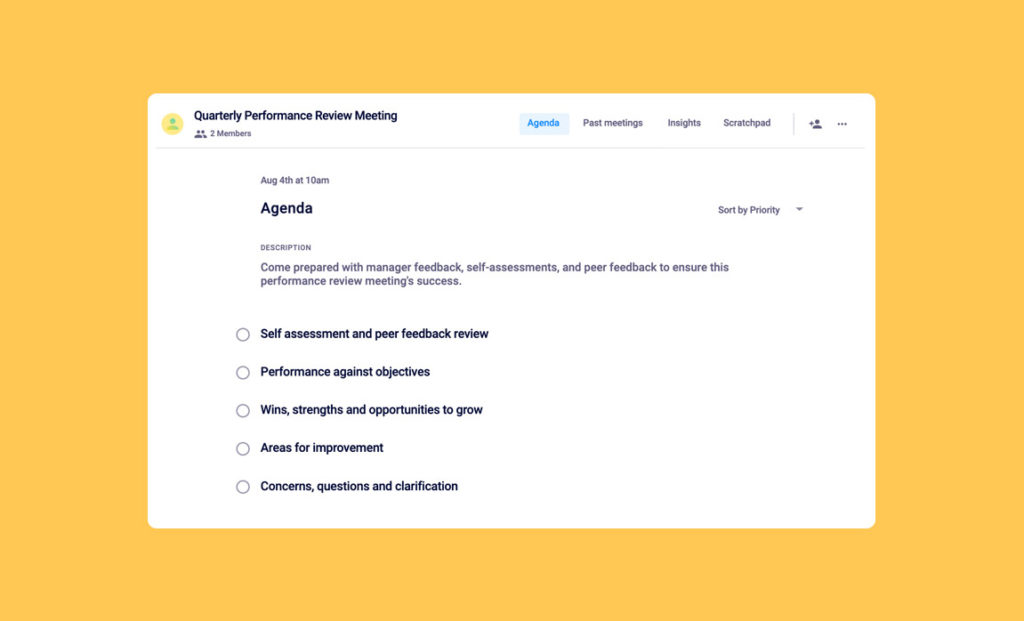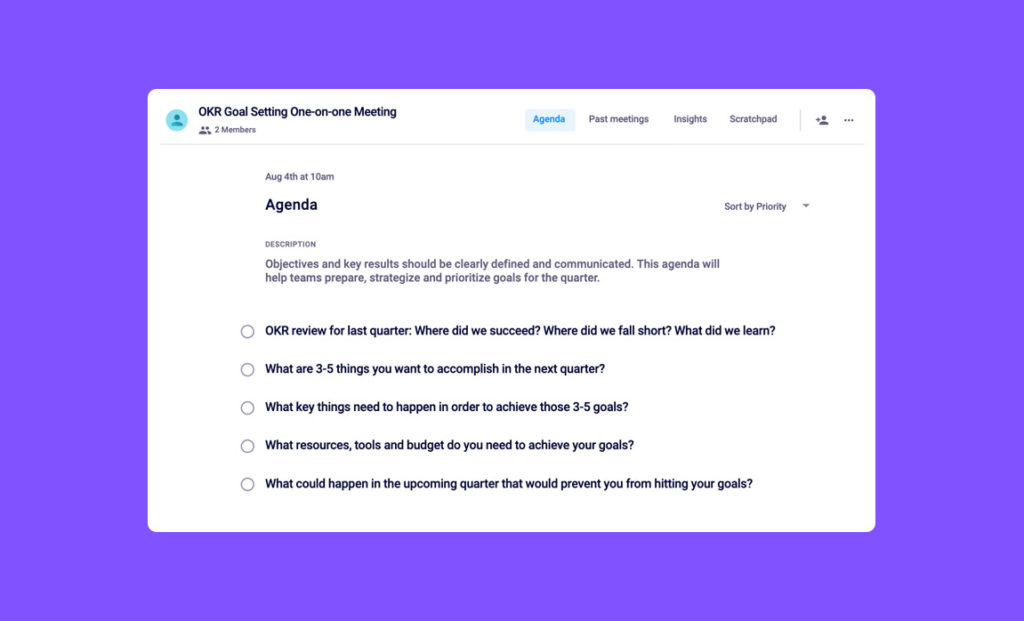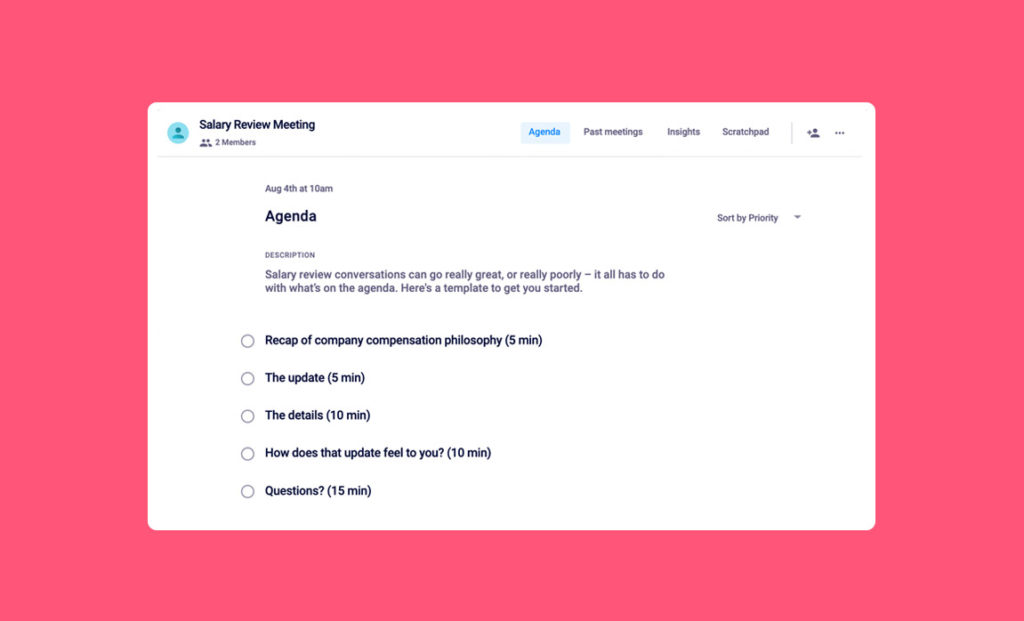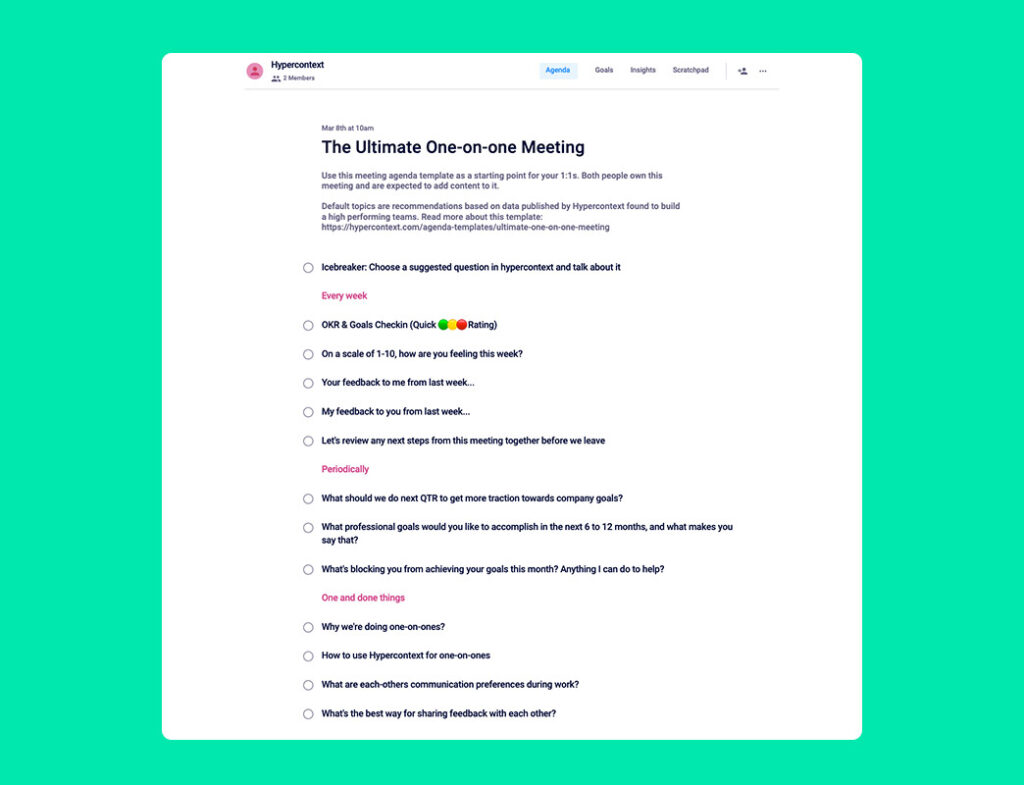9 One-on-one meeting templates
9 different types of one-on-one meetings that are probably already in your calendar 🗓 and what you should add to your next agenda.
One-on-one meetings are the most important opportunities for managers to give and get feedback, build trust and discuss growth and development with their direct reports. While every team member is different (and your one-on-ones should be tailored to each person!) here are 9 different types of one-on-one meeting templates to jump-start your next conversation.
Jump to a template:
- First one-on-one meeting
- Weekly one-on-one meeting
- Monthly one-on-one meeting
- Remote one-on-one meeting
- Skip level one-on-one meeting
- Quarterly performance review one-on-one meeting
- OKR goal setting one-on-one meeting
- Peer to peer one-on-one meeting
- Salary review meeting
- Bonus: The ultimate one-on-one meeting
First one-on-one meeting
In your first meeting with a new or inherited employee, what do you discuss to lay the foundation for a productive working relationship? Instead of sharing historical context on the team or company, use this initial meeting to learn as much as you can about how your new report likes to work, who they are outside of the office and what success looks like to them:
- What do you like to do outside of work?
- How do you like to communicate? (Phone, email, Slack, etc.)
- What time of day do you do your best work?
- What kind of projects are you most excited to work on?
- What are your 1 year, 3-year, and 5-year career goals?
- What does success look like for you in 30 days?
👉 Try this template in Hypercontext.
Weekly one-on-one meeting
Recent findings from our 2019 State of one-on-ones survey show that 48.5% of managers have one-on-ones weekly. If you’re a manager having one-on-ones weekly with your team, chances are your agenda will be shorter as you’re syncing more often. Try using these questions to prompt discussions:
- What has been the highlight and lowlight of your past week?
- Goals – how are you tracking this past week? Any blockers I can help remove?
- What, if anything, feels harder than it should be in your day to day work?
- If there was one thing I could do differently to help you more, what would it be?
- On a scale of 1-10, how happy are you with your work-life balance? How can we get closer to 10?
👉 Try this template in Hypercontext.
Monthly one-on-one meeting
With a larger team of direct reports, your one-on-ones might be monthly instead of weekly or bi-weekly. If that’s the case, you’re hopefully syncing up between meetings via other communication tools, but regardless, your agenda will be a bit more robust. Here’s an agenda to keep the conversation focused and not just another status updates:
- What were your work and non-work highlights this past month?
- Goals – how are you tracking and feeling about all things numbers/statistics?
- What, if anything, feels harder than it should be in your day to day work?
- How have you felt about my level of presence/support over the past month?
- What is one thing I could experiment with doing differently this month to help you more?
👉 Try this template in Hypercontext.
Remote one-on-one meeting
Managers with remote direct reports face different challenges than on-site managers. Often times they’re coordinating different time zones and using additional technology to facilitate their meetings. This 121 meeting template focuses on engaging remote workers that don’t have the added benefit of things like water-cooler chats, or peer lunches:
- How are things going?
- What’s something you’re really jazzed about outside of work?
- What have you been working on this week?
- What has been the work highlight/lowlight from the past week?
- What are you working on next week?
- Where do you need help?
- Are you happy with our level of communication? How would you change it?
- What’s top of mind right now that we haven’t talked about yet?
👉 Try this template in Hypercontext.
Skip level one-on-one meeting
One-on-one meetings that skip a level of management are often more infrequent, happening on a monthly or quarterly basis. The intention of the meeting isn’t to get employees to rag on their boss, but rather to share important information with the employee on larger company objectives, get a pulse on how the employee is engaged and collect feedback. Here are 4 items to discuss in a skip level one-on-one:
- What are you LEAST clear about – in terms of our strategy and goals?
- What professional goals would you like to accomplish in the next six to 12 months, and what makes you say that?
- Are you happy in your role? What could make it better for you?
- What’s one thing we should start, stop and continue doing as a company?
👉 Try this template in Hypercontext.
Quarterly performance review one-on-one meeting
Quarterly reviews are unique to every company. Some focus heavily on self-assessments and peer feedback, while others focus on goals and objectives. This template marries performance feedback with goals to prompt a well-rounded discussion:
- Self-assessment and peer feedback review
- Performance against objectives
- Wins, strengths and opportunities to grow
- Areas for improvement
- Concerns, questions and clarification
👉 Try this template in Hypercontext.
OKR goal setting one-on-one meeting
Depending on your goal-setting framework, if you’re operating under OKRs, it’s crucial that your team dives into each quarter with a complete understanding of what their goals are (and how they ladder up to team and company-wide goals). Planning the quarter with each individual on your team also gives a deeper sense of ownership for the work and metrics that they’re responsible for. Who doesn’t want that?
To kickstart your quarter off on the right foot, here are 5 items to add to your meeting:
- OKR review for last quarter: Where did we succeed? Where did we fall short? What did we learn?
- What are 3-5 things you want to accomplish in the next quarter?
- What key things need to happen in order to achieve those 3-5 goals?
- What resources, tools and budget do you need to achieve your goals?
- What could happen in the upcoming quarter that would prevent you from hitting goals?
👉 Try this template in Hypercontext.
Peer to peer one-on-one meeting
Peer-to-peer one-on-ones are intended to connect two individuals (cross-functionally or within the same department) who don’t report to one another. The goal of this meeting is to open up channels for feedback and collaboration, outside of an individual’s direct team or from a top-down direction. Cross-funcitonal peer to peer meetings are also a powerful way to break down silos and open up communication channels. For this meeting to be truly effective, add these 4 items to your agenda:
- What’s one thing I can do to make your job easier?
- What’s the biggest challenge you and your team are facing?
- What’s something me or my team can do to improve cross-departmental communication?
- What’s coming down the pipe in the next 3 months that I should know about?
👉 Try this template in Hypercontext.
Salary review meeting
While this isn’t a traditional one-on-one meeting and there’s no set cadence, it’s important that you bring some structure to this meeting (if not for you, then at least for your direct report. Salary conversations can be really great conversations, but they can also be incredibly demotivating for employees. No matter what kind of news you’re sharing with your direct report, these 5 items are sure to help you prepare for a better, more smooth conversation:
- Recap of company compensation philosophy
- The update
- The details
- How does that update feel to you?
- Questions?
👉 Try this template in Hypercontext.
The ultimate one-on-one meeting
This 1:1 template is based on findings from the State of High Performing Teams in Tech report. Managing people is hard. This template provides a foundation from which to build trust, support career development, communicate better and empower your team members. The agenda is broken out into 3 sections: topics to discuss every week, periodically and one-off. Here’s what to add to each section:
Every week:
- Icebreaker
- OKR & goals check-in (quick 🟢🟡🔴 rating)
- On a scale of 1-10, how are you feeling this week?
- Your feedback to me from last week…
- My feedback to you from last week…
- Let’s review any next steps from this meeting together before we leave
Periodically:
- What should we do next quarter to get more traction towards company goals?
- What professional goals would you like to accomplish in the next 6 to 12 months, and what makes you say that?
- What’s blocking you from achieving your goals this month? Anything I can do to help?
One and done things:
- Why we’re doing one-on-ones
- How to use Hypercontext for one-on-ones
- What are each other’s communication preferences during work?
- What’s the best way for sharing feedback with each other?
👉 Try this template in Hypercontext.
For more one-on-one and team meeting templates, check out our gallery of free agenda templates.
Bonus: 20 one-on-one meeting questions for managers and employees
Meeting agenda templates are an incredible source of inspiration. But, as you continue to have more one-on-one meetings, it’s important that your agendas evolve. For an added dose of inspiration, here are 20 tried and tested one-on-one meeting questions that you can add to future meetings:
For managers to ask employees
- Who’s someone in the company that you’d like to learn more from?
- What’s one thing we can do to improve the performance of the team?
- What do you like about our one-on-one meetings? What can be improved?
- Who on our team deserves a shoutout for their work and why?
- On a scale of 1-10, how happy are you at work?
- Are you proud of the work you do here?
- Do you have any questions that, if answered, would help you in your day-to-day?
- What, if anything, is stressing you out?
- If I could improve one skill between this meeting and the next, which would you choose?
- What “soft skills” do you think I excel at most? What can I work on?
For employees to ask their manager
- What steps can I take right now to progress my career with the company?
- What’s a skill you think I can learn that will help me do a better job?
- What can I do to help improve the performance of the team?
- What’s something you wish we did better as a team?
- When’s the best time to get feedback on my work?
- How am I doing with [this specific thing]?
- What’s an example of a situation I’ve handled well internally, a situation I’ve handled poorly?
- After a failure, what do you do to pick yourself up again?
- What are your biggest challenges leading the team?
- Do you think I contribute enough in team meetings?
Use Hypercontext to run better one-on-one meetings
What to do now
Now that you've read this article, here are some things you should do:
- Check out our YouTube channel for more tips on management skills and team building.
- You should try Hypercontext to see how it can help you run a high performing org.
- If you found this article helpful, please share it with others on Linkedin or X (Twitter)
In this post
In this post










